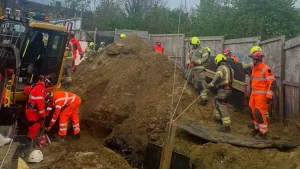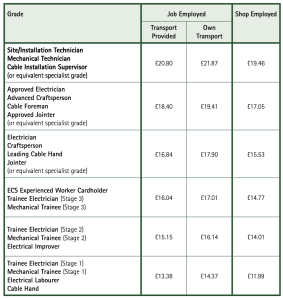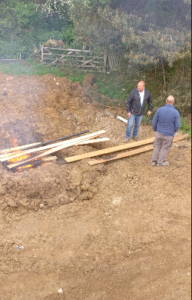CSCS get overhaul as it is dogged with complaints
This post has already been read 2065 times!
If you have phoned the CSCS for a new card this January you will know that they aren’t issuing new cards as they are swapping over to a new system as nationaltradesmen.co.uk has learned.
Most people who work in construction are familiar with CSCS cards and taking the tests and applying for a card is a bit of a chore.
They are used by the majority of contractors and clients to provide proof that those working on sites have the training and qualifications required for the work they carry out. But not everyone will be aware that the recent introduction of an online application service, which marks the single largest operational change the company has undertaken since it was set up in 1995.
CSCS is the first to admit that, in recent years, applying for a CSCS card has not provided the smoothest of customer experiences and that the application process has been behind the curve when it comes to offering applicants a truly modern service. “Until recently, you couldn’t actually apply online,” says CSCS chief executive Graham Wren.
“You could get information on the CSCS website, but you were required to scan and email in your documents before making a lengthy telephone call to process your application and make a payment – a process that had its critics, particularly during busy periods when the service struggled to meet the expectations of the industry.”
Modernised service
The development of the online application system came at the same time as the Construction Industry Training Board (CITB) ended its role delivering the CSCS contact centre after 20 years. In late 2017, the CITB formally notified CSCS of its intention to withdraw from delivering the service, a decision it took as part of the organisation’s Vision 2020 programme. CITB’s future vision involves focusing on fewer activities centred on its core priorities of careers, training and development, standards and qualifications.
“CSCS is extremely grateful for the contribution CITB has made to the success of the scheme,” Wren says. “Each year the CITB processed more than 400,000 card applications and one million contact-centre enquiries on behalf of CSCS. However, following CITB’s decision to exit the contract, it became our absolute priority to identify new and smarter ways of working that would deliver a first-class service to our 1.5 million cardholders.”
He adds: “Fortunately, there was a sensible notice period to exit the contract with CITB, so we used the time wisely to plan for the new service. Over the past two years, we have been working with a number of experts in contact centres and online services, and we have used this advice and guidance to design and build a modern service that is specifically designed to meet the needs of our applicants.”
Grandfather rights
As part of CSCS’s drive to place qualifications at the heart of every application, it is reminding the industry of its plans to withdraw cards under ‘industry accreditation’.
Also known as ‘grandfather rights’, industry accreditation allowed workers to obtain CSCS cards on the strength of an employer’s recommendation rather than the achievement of a recognised qualification. CSCS closed industry accreditation to new applicants in 2010, but those already holding a card are currently able to renew on the same basis. CSCS has consulted with the industry and agreed a plan that will pave the way for the eventual withdrawal of cards issued under industry accreditation. From 1 January 2020, all cards renewed under the system will expire on 31 December 2024 and CSCS will stop issuing the card from 30 June 2024.
Following the closure of the Construction Related Occupation card and the Construction Site Visitor Card, those gained by industry accreditation are the only ones in the CSCS scheme that do not require the holder to achieve a recognised qualification,” says CSCS head of communications Alan O’Neile.
“Industry accreditation does not support the sector’s desire for a fully qualified workforce and, as such, it will be withdrawn.”
What each of the 60,000 industry accreditation cardholders need to do next depends on their occupation and any qualifications they may already hold. Those without qualifications will be required to register for the appropriate qualification for their occupation before their cards expire in 2024.
“The withdrawal of industry accreditation will be the final step towards achieving the Construction Leadership Council’s objective of ensuring cards are only issued to those who have achieved, or are in the process of achieving, a nationally recognised construction-related qualification,” O’Neile says.
Visit www.cscs.uk.com/ia to find out which steps you need to take to replace a card issued under industry accreditation
The new service went live in early December and the process for applying for a card is now completely online, including payment. “The introduction of an online application service may not sound particularly revolutionary to many – after all, shopping online has been part of everyday life for a number of years now,” Wren says. “But to regular CSCS applicants, this is a significant improvement and one that many have been asking for in recent years.”
So what does this mean for CSCS card applicants? There are a number of benefits, whether that’s for those applying for the first time or simply renewing their existing card, according to the organisation.
“To regular CSCS applicants, this is a significant improvement and one that many have been asking for in recent years”
Graham Wren, CSCS
“Online applications are faster than any other means of application,” Wren says. “It takes minutes to complete and, once your application has been approved, an electronic version of the card can be sent directly to an app downloaded to your mobile phone, with the physical card arriving by post within three-to-five working days.”
The web-based offering is also convenient and designed to fit around busy working lives. “Online applications are open 24 hours a day, seven days a week, all year round, and you can apply from a mobile phone, tablet device or PC,” Wren says. “The process is straightforward. You won’t need to send us hard copies of your documents and you won’t need to pick up the phone to make a lengthy call to apply. It’s also secure – your personal information and payment details are kept entirely confidential throughout the application process.”
Application support
The new service also includes a new contact centre, which users can call for support when making an application. “If people can’t find the information that they need, or they are having a problem, they will still be able to phone up and get the advice and support they require,” he says. “But we expect that once people get used to the online process, call volumes will reduce and it will serve as a help desk for the more complex applications.”
Another significant benefit of investing in an online service for CSCS is that it helps to tackle card fraud. Over the past few years, the organisation has made several high-profile changes that ensure construction workers hold the correct qualifications for the job they do on site. The most well-known of these was the withdrawal of the Construction Related Occupation card and the planned closure of the Construction Site Visitor card, which allowed non-qualified workers to access sites.
Now that the achievement of a qualification is essential for every application, a card has become significantly harder to obtain. Historically, in some cases you simply required the CITB Health, Safety and Environment test, which to an experienced operative required little or no study to pass. Today, applicants are expected to achieve a recognised qualification – usually an NVQ – which takes up to two years to complete.
Black-market operators
As a result, the card is becoming more attractive to those operating in the black market. “In recent times we have seen a significant rise in the number of fake certificates coming through our application process,” Wren says. “The fraudsters are producing high-quality fake certificates that look like the real thing, and if not identified by our application-processing team, a genuine CSCS card gets issued on the back of the fake certificate.”
To tackle this type of fraud, the new online system includes automatic electronic checks with the awarding organisations that own and deliver the qualifications. Eventually every certificate will be checked against the relevant awarding organisation’s database and if the result comes back as a positive match, then the application can progress. If the electronic check comes back with an issue flagged, then the system will suspend the application pending further investigation.
“So the instances of fraud based on fake certificates will be greatly reduced,” Wren says. “It will happen with every application rather than relying on a manual check carried out by a member of the CSCS team.”
With CSCS having now completed this digital journey, it is keen to stress that the new online application system delivers benefits for both applicants and the CSCS itself. On the one hand, using the service will be faster and more convenient for workers. On the other, it will help prevent fraud, resulting in improved standards and safety on site.
Further information on CSCS’s new application service can be found at www.cscs.uk.com/apply






















